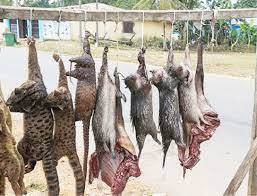The Registrar of Environmental Health Council of Nigeria, Dr Yakubu Baba, has cautioned Nigerians against consumption of bushmeat so as not to contract Lassa Fever.
Baba said this in an interview with the News Agency of Nigeria on Thursday in Abuja.
He said the warning was necessary because the virus has residual effects even after the death of the animal.
NAN reports that the viral Hemorrhagic Fever is infectious and can cause severe, life-threatening illness, damage the walls of tiny blood vessels, making them leak and hampering the blood’s ability to clot.

The resulting internal bleeding is usually not life-threatening, but the disease can be.
Also Read:
- At 65, AbdulRazaq champions new era in filmmaking, by Seun Oloketuyi
- Why I visited Babangida, Abdulsalami – Remi Tinubu
- I was detained for calling medication drug in UK — Nigerian + Video
- Fani-Kayode speaks after acquittal in case by EFCC
- Portable brags over capacity to win Grammy: ‘I rise from nowhere, nobody rise me’
Its symptoms usually start within 21 days of becoming infected, and most cases start with a fever and flu-like symptoms that may be accompanied by diarrhoea and or vomiting.
The registrar said as environmental health personnel, it was their responsibility to advise the people to reduce or stop consumption of bushmeat for now, “because it is not healthy”.
“The virus has a residual effect, even after the death of the animal, it still remains with the animal,” Baba added.
The registrar said that the fight against Lassa fever should be a collective responsibility; as such, all Nigerians should adopt measures to guard against its spread.
Baba said EHCON would embark on massive capacity building of practitioners to update their knowledge on innovations and approaches to health education and promotion, including Lassa fever and other diseases.
The registrar added that environmental health personnel in states and local governments would also embark on public awareness on proper waste management.
He advised the populace to ensure that food stores and warehouses were secured to prevent rats from getting access to the facilities.
“In the characteristics of the rat, when there is no food, they vacate the house. This is another approach we are adopting to take the message to the grassroots.
“It is our collective responsibility, as the government is doing their part, you as a citizen also need to do your part, so we’ll encourage proper waste management,” he said.
Baba also urged environmental health specialists in the academia to embark on research and innovations geared towards total eradication of Lassa fever in the country.


